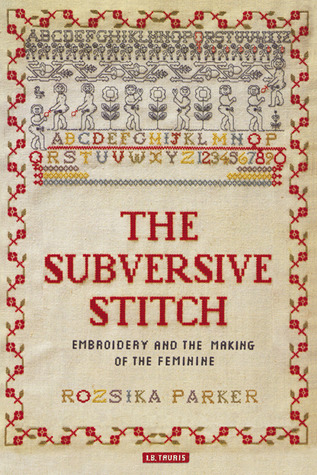
The Subversive Stitch: Embroidery and the Making of the Feminine
by Rozsika Parker
Genres: History, Non-fictionPages: 256
Rating:

Synopsis:Rozsika Parker's now classic re-evaluation of the reciprocal relationship between women and embroidery has brought stitchery out from the private world of female domesticity into the fine arts, created a major breakthrough in art history and criticism, and fostered the emergence of today's dynamic and expanding crafts movements.
The Subversive Stitch is now available again with a new Introduction that brings the book up to date with exploration of the stitched art of Louise Bourgeois and Tracey Emin, as well as the work of new young female and male embroiderers. Rozsika Parker uses household accounts, women's magazines, letters, novels and the works of art themselves to trace through history how the separation of the craft of embroidery from the fine arts came to be a major force in the marginalisation of women's work. Beautifully illustrated, her book also discusses the contradictory nature of women's experience of embroidery: how it has inculcated female subservience while providing an immensely pleasurable source of creativity, forging links between women.
Rozsika Parker’s The Subversive Stitch is a pretty academic work, illustrated with lots of plates (though these are in black and white and not really of the greatest quality, at least in the edition I have. Parker’s thesis is basically that embroidery was a huge part of how femininity was constructed, particularly in the Victorian era, and we’ve seen a lot of things both deeper in the past and now through that lens.
No doubt there’s more up to date work now, but I’m under the impression this is a bit of a classic. It can be dry, especially if you’re not interested in the subject — as I mentioned, it really is pretty academic. But there are some fascinating insights here, and also some correctives to received wisdom about what exactly the history of embroidery has been like. Solid lesson: don’t believe a Victorian source, possibly not even about Victorian norms.
Perhaps more of interest to those interested in feminist and women’s history than to those interested in embroidery per se.
Rating: 4/5
